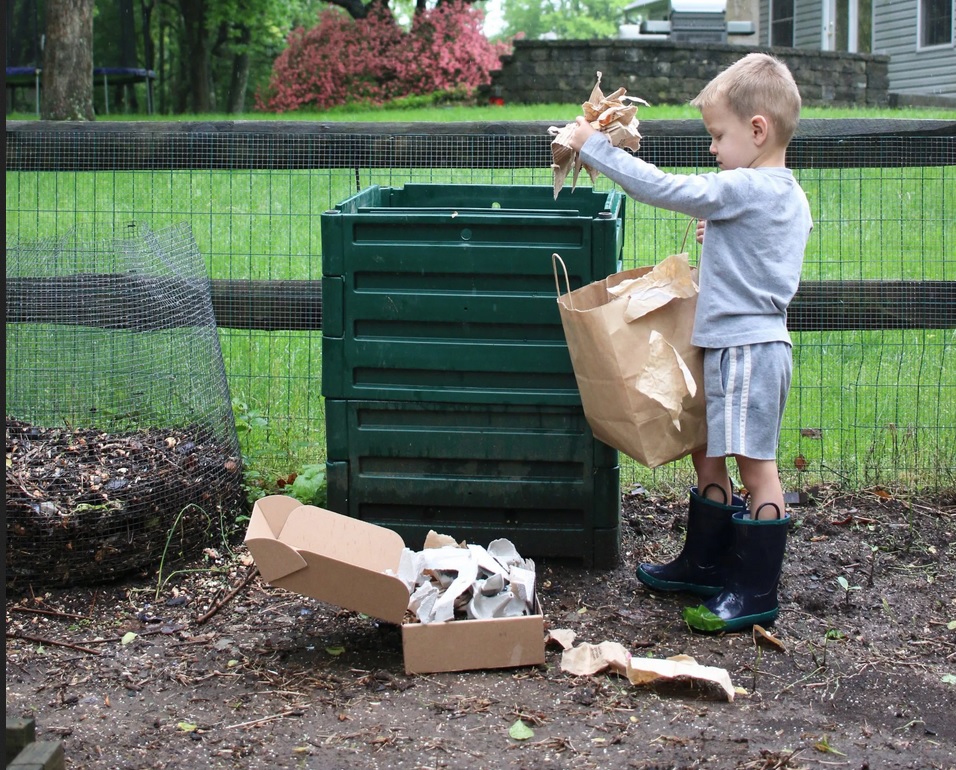Don’t mind getting your hands a bit dirty? Then consider composting at home. It’s cheap, easy, good for the environment and something that the husband and kids can get involved with too. Here’s how it works and how to get started.
Why compost at home?
Home composting is a simple and effective way to reduce waste, improve soil health and create a more sustainable environment. It is the process of breaking down organic matter, such as food scraps and yard waste, into a nutrient-rich soil amendment that can be used to nourish your plants and gardens. Here are the main reasons for doing that:
- Reduces waste: Home composting is an easy way to reduce the amount of waste that goes to landfill. Food scraps and garden waste make up a significant portion of household waste, and by composting it at home, you can divert it from the landfill and reduce your carbon footprint.
- Improves soil health: Compost is a rich, nutrient-dense soil amendment that can improve the health of your soil. It helps to retain moisture, promotes healthy root growth and can improve the fertility of your soil.
- Saves money: By composting at home, you can reduce your need for chemical fertilisers and save money on gardening expenses. Composting also allows you to recycle kitchen scraps, which can help to reduce your food bill.
- Reduces greenhouse gases: When food scraps and yard waste decompose in landfill, they produce methane, a potent greenhouse gas. By composting at home, you can reduce the amount of methane produced and help to combat climate change.
- Educational: Composting at home can be a fun and educational activity for families and communities. It is a great way to teach children about the importance of reducing waste and preserving the environment. And it’s easy!
How to compost at home
The first step in home composting is to choose a location for your compost pile or bin. It is best to place it in an area that is convenient for adding and turning the materials, but also protected from heavy rain and strong winds. A sunny location is ideal, as warmth from the sun will help to speed up the decomposition process.
The next step is to gather materials for your compost pile. A good mix of green materials, such as grass clippings and kitchen scraps, and brown materials, such as leaves and twigs, will create the best environment for decomposition. You can also add other organic materials such as coffee grounds, eggshells, and paper products. Avoid adding meat, bones, dairy products, or pet waste, as these can attract pests and create unpleasant smells.
Once you have your materials ready, you can begin to build your compost pile. Start by layering the green and brown materials alternately, making sure to add a few inches of soil or finished compost on top. This will help to introduce beneficial microorganisms that will aid in the decomposition process. The pile should be kept damp, but not too wet, and should be turned regularly to provide oxygen and promote decomposition.
The composting process can take anywhere from several weeks to several months, depending on the materials and conditions. One way to speed up the process is to use a compost bin, which will contain the materials and keep them at a consistent temperature. You can also use a compost accelerator, which contains microorganisms and enzymes that will help to break down the materials quickly. The most natural compost accelerator is free and easy to get hold of – urine!
When your compost is ready, it will have a dark, crumbly texture and a rich, earthy smell. You can use it to enrich your soil, add nutrients to your plants, and reduce the need for chemical fertilizers.
In addition to its environmental benefits, home composting can also be an affordable and easy way to reduce the amount of waste that goes to landfills. It can also be a fun and educational activity for families and communities. Dad can help build or buy the compost bin, and the kids can help by regularly adding to it.
However, it’s important to note that home composting may not be suitable or allowed in some areas such as apartment and blocks of flats. If in doubt it’s always best to check with your local authority or council before starting.
Overall, home composting is a simple and effective way to reduce waste, improve soil health, and create a more sustainable environment. With a little bit of effort and patience, you can turn your kitchen scraps and garden waste into a valuable resource for your garden and plants. And most of all, it’s a fun activity that will get you, your partner and your kids off the sofa and out into the great outdoors. Enjoy!
